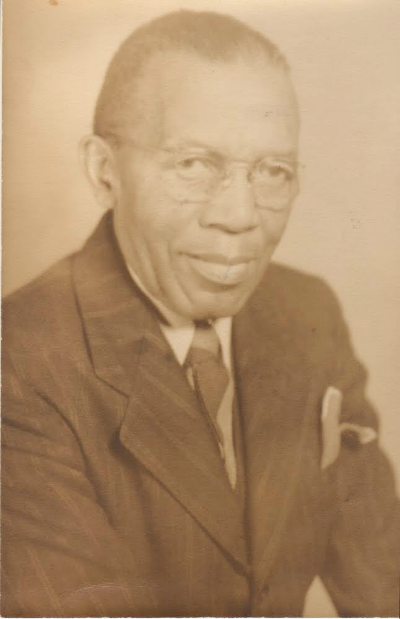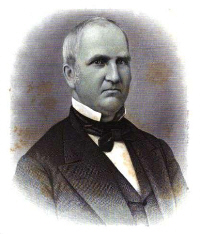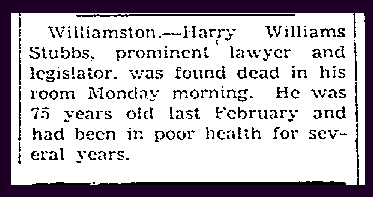For a period of more than a third of a century Robert W. Hyman was a resident and prominent business man of Chicago. Here he passed away, on the 3d of June, 1903, when in the prime of life. His history is the record of continuous progress gained through the ready adaptability and the wise use of which he made of the opportunities that came to him. He stood as a high type of American manhood and citizenship and not only was his advancement marked by material gain but also by that intellectual progress that follows a receptive and retentive mind and a deep interest in all those things which are broadening and elevating.
He was born in Hamilton, Martin County, North Carolina, on the 26th of October, 1850, and in both the paternal and maternal lines is descended from families of that state. His parents, Theophilus and Elizabeth Hyman, were both born and reared in the eastern part of North Carolina, and Robert W. Hyman spent his youthful days in Edgecombe county, there pursuing his education in the common schools until at the age of fifteen years he felt it incumbent upon him to start out in the business world and entered commercial circles as a clerk in a general store owned and conducted by his uncle. He also carried the mail during the period of the Civil war. His youthful training had been received upon his father’s farm and the outdoor life and the work of the fields had developed in him a strong and robust nature, together with that independent spirit which is so ofen the direct outcome of the outdoor life.
This business that the uncle conducted was later handed down to the two sons of Robert W. Hyman, who are still owners of the store. Their father continued in active connection therewith until 1869 and then leaving North Carolina, moved to Norfolk, Virginia. Soon afterward, however, he made his way northward to New York city and became clerk in connection with the cotton brokerage business conducted by his uncle. Three years were spent in the eastern metropolis and on the 30th of May, 1872, he arried in Chicago where he was still associated with his uncle, who engaged in the real-estate field and also engaged in loaning money. He soon familiarized himself with the property values here and such was the knowledge that he acquired that for a long period his opinions concerning real estate were accepted as authority. He became agent here for the E. Mott Robinson estate of New York, which he thus represented for many years. He also purchased and sold large outlying tracts of property for various owners and handled the Hetty Green interests here through her trustees. He was a most enterprising, alert, successful and prosperous real-estate operator and possessed the ability of predicting valuations years in advance. His knowledge, advice and judgement were frequently sought and his sagactiy was notable. He was seldom if ever at fault in foretelling the possible condition of real-estate prices and his keen discrimination enabled him to so place his capital and that of wealthy men whom he represented that substantial results were secured. In his later years he was associated with a Mr. Mandel in important business interests and was also a director of the Chicago Title & Trust Company. He was likewise one of the charter members of the real-estate board and was honored with election to its directorate.
On the 26th of October, 1880, Mr. Hyman was married to Miss Anna L. Burrows, a daughter of Robert and Permelia (French) Burrows, of Boston, the former of English descent and the latter of Scottish lineage. In the year 1865 the Burrows family came to Chicago and the father engaged in the meat business here at an early day. Mr. and Mrs. Hyman became the parents of two sons: Robert W. , who is now vice president of the Continental Causalty Company; and Rae F., who is engaged in the wholesale shoe business.
While Mr. Hyman usually supported the democratic party he did not consider himself bound by political ties and frequently cast an independent ballot. He always suportted the men whom he regarded as best qualified for office and in all municipal affairs manifested a public-spirited citizenship. He held membership in St. Paul’s Universalist church and was a warm admirer of Dr. Ryder, it’s honored and esteemed pastor. His name was on the membership roll of the Union League, the Chicago Athletic and the Iroquois Clubs and the nature of his recreation was largely indicated in the fact that he belonged to several fishing and shooting clubs. He was also extremely fond of travel and of literature and he possessed a remarkably retentive memory, holding in the storehouse of his mind much that he read, so that he could call upon it at any moment. By nature he was naturally social and his kindly spirit, his geniality and his deference for the opinions of others were factors in his widespread popularity. The breadth of his interests and the depths of his intelligence also made him a favorite in cultured society circles of the city.
Source: Currey, J. Seymour. Chicago: Its History and Its Builders, a Century of Marvelous Growth. Chicago: S.J. Clarke Pub. Co, 1912. [Full-text online at Google Books]

 Cushing Biggs Hassell was born near Williamston, in Martin County, North Carolina, on the 14th day of October 1808. His father, John N. Hassell, was an honest and hospitable man. His death occured in the year 1824. He left no property. His wife, Martha Biggs, was a woman of remarkable sagacity, energy and decision of character. For the thirty years prior to her death she was confined to bed with severe rheumatism. In this affliction she displayed wonderful resignation and cheerfulness. She was a zealous member of the Primitive Baptist Church. During the life of his father Cushing Biggs Hassell attended the neighborhood schools at irregular intervals. Here he imbibed a thirst for knowledge and acquired habits of thoughtfulness and studiousness that became the ruling factor in his life. During his idle hours as a merchant he pursued his studies in the classical languages. “While at school he was noted above his fellows for aptness at learning, steady moral habits, and serious disposition. At the age of eighteen he entered into some excellent resolutions, to which he steadfastly adhered through life – to wit: To abstain from the use of liquor and tobacco; not to indulge in profanity or gaming; and to be stricly honest, truthful and upright in all his dealings.”He was twice married. In 1832 he married Mary Davis, who bore him seven children and died in 1846. Three years afterward he married Martha Maria Jewett, widow of Daniel E. Jewett, of Warich, New York. She bore him four children.
Cushing Biggs Hassell was born near Williamston, in Martin County, North Carolina, on the 14th day of October 1808. His father, John N. Hassell, was an honest and hospitable man. His death occured in the year 1824. He left no property. His wife, Martha Biggs, was a woman of remarkable sagacity, energy and decision of character. For the thirty years prior to her death she was confined to bed with severe rheumatism. In this affliction she displayed wonderful resignation and cheerfulness. She was a zealous member of the Primitive Baptist Church. During the life of his father Cushing Biggs Hassell attended the neighborhood schools at irregular intervals. Here he imbibed a thirst for knowledge and acquired habits of thoughtfulness and studiousness that became the ruling factor in his life. During his idle hours as a merchant he pursued his studies in the classical languages. “While at school he was noted above his fellows for aptness at learning, steady moral habits, and serious disposition. At the age of eighteen he entered into some excellent resolutions, to which he steadfastly adhered through life – to wit: To abstain from the use of liquor and tobacco; not to indulge in profanity or gaming; and to be stricly honest, truthful and upright in all his dealings.”He was twice married. In 1832 he married Mary Davis, who bore him seven children and died in 1846. Three years afterward he married Martha Maria Jewett, widow of Daniel E. Jewett, of Warich, New York. She bore him four children.